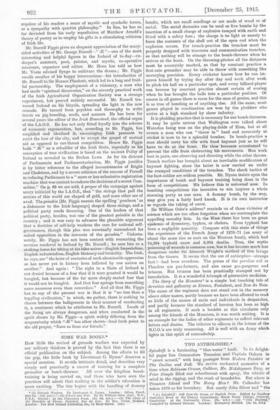SOME WAR BOOKS.* How little the revival of grenade warfare
was expected by our military thinkers is proved by the fact that there is no official publication on the subject. Among the efforts to fill the gap, the little book by Lieutenant G. Dyson" deserves a special mention. It avoids intricate detail, and describes very simply and practically a course of training for a complete
grenadier or bomb-thrower. All over the kingdom bomb- training is being carried on, and those who have seen the practices will admit that nothing in the soldier's education is more exciting. The tiro begins with the handling of dummy • (1) Grenada Warfare. Ly Lieutenant C. Dyson. London: Slfton, I'raed, and Co. rd. net.]---(2) &were and War. My Sir William Osier, Bart., M.D., FALB. Oxford : at the Clarendon Press. Ifs. ad. net.]--(3) The Story of the Munster* at Etreu.s, Peetvbert, Rue du Bois. By Mrs. Victor. Rickard. London: The New Ireland Publishing Co., 13 Fleet Street. is3d.1
bombs, which are small sandbags or are made of wood or of metal. The metal dummies can be used as live bombs by the insertion of a small charge of explosive tamped with earth and fitted with a safety fuse ; the charge is 'so light as merely to force the contents of the shell out of the open end when the explosion occurs. For trench-practice the trenches must be properly designed with traverses and communication trenches, so that nothing will be strange to the bomb-thrower when he arrives at the front. On the throwing-pitches all the distances must be accurately marked, so that by constant practice a first-rate grenadier may be able to throw with something like unvarying precision. Every cricketer knows how he can im- prove himself by trying day after day and week after week to pitch his ball on a particular spot, and every billiard-player can become by constant practice almost certain of scoring when he has brought the balls into a particular position. Of course in all games there is room for the man of genius, and this is as true of bombing as of anything else. All the same, most games played in combination are won by the plodders who arrive at a high standard by sheer industry.
It is plodding practice that is necessary for our bomb-throwers. It may be quite untrue that Wellington ever talked about Waterloo being won on the playing-fields of Eton, but at all events a man who can " throw in " hard and accurately at cricket is sure to be a splendid bomber. In bomb-practice a man should carry his rifle with fixed bayonet just as he will have to do at the front. He thus becomes accustomed to prevent the rifle from obstructing his movements. Men work best in pairs, one observing and directing while the other throws. Trench warfare has brought about an inevitable modification of bayonet fighting, since the latter is now carried on under the cramped conditions of the trenches. The shock tactics of the foot-soldier are seldom possible. Mr. Dyson insists upon the importance of bomb and bayonet training being done in the form of competitions. We believe this is universal now. In bombing competitions the incentive to win inspires a whole storming party as one man. A dummy bomb, by the way, may give you a fairly hard knock. It is its own instructor as regards the taking of cover.
Sir William Osler's address' reminds us of those victories of science which are too often forgotten when we contemplate the appalling casualty lists. In the West there has been no groat epidemic of dysentery, typhus, or cholera. Even typhoid 'has been a negligible quantity. Compare with this state of things the experience of the French Army of 1870-71 (an army of about the same size as ours on the Western front), which had 74,204 typhoid cases and 8,904 deaths. True, the septic poisoning of wounds is common now, but it has become much less dangerous under Sir Almroth Wright's method of free lavage from the tissues. It seems that the use of antiseptics—strange fact !—had been overdone. The germs of the peculiar soil in Flanders are pus-formers, and also cause gas-gangrene and tetanus. But tetanus has been practically stamped out by inoculation. It is a wonderful triumph of preventive medicine.
The Story of the Manstersa is a simple but touching tale of devotion and gallantry at Etroux, Festubert, and Rue du Bois. The name of the regiment does not stand out in the memory above other names, partly because we have been allowed to read so little of the names of units and individuals in despatches, and partly because the standard of heroism has been so high in all regiments. If such a booklet as this circulates only among the friends of the Monsters, it was worth writing. It is an example for the ladies of other regiments to collect relevant letters and diaries. The tributes to officers in the letters of the N.C.O.'s are truly reassuring. All is well with an Army which fights in this spirit of comradeship.


































 Previous page
Previous page